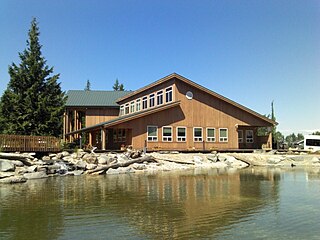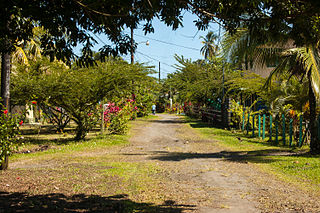Capitol Land Trust (CLT) is a 501(c)(3) non-profit conservation organization based in Olympia, Washington, United States. CLT was formed in 1987 by a group of citizens in South Puget Sound who were concerned about growth in the area.
Capitol Land Trust (CLT) is a 501(c)(3) non-profit conservation organization based in Olympia, Washington, United States. CLT was formed in 1987 by a group of citizens in South Puget Sound who were concerned about growth in the area.
Capitol Land Trust is dedicated to furthering collaborative and strategic conservation of southwest Washington’s essential natural areas.

In the United States, a conservation easement is a power invested in a qualified land conservation organization called a "land trust", or a governmental entity to constrain, as to a specified land area, the exercise of rights otherwise held by a landowner so as to achieve certain conservation purposes. It is an interest in real property established by agreement between a landowner and land trust or unit of government. The conservation easement "runs with the land", meaning it is applicable to both present and future owners of the land. The grant of conservation easement, as with any real property interest, is part of the chain of title for the property and is normally recorded in local land records.

Charlotte Douglas International Airport is an international airport serving Charlotte, North Carolina, United States, located roughly 6 miles (9.7 km) west of the city's central business district. Charlotte Douglas is the primary airport for commercial and military use in the Charlotte metropolitan area. Operated by the city of Charlotte's aviation department, the airport covers 5,558 acres of land.

The Squaxin Island Tribe are the descendants of several Lushootseed clans organized under the Squaxin Island Indian Reservation, a Native American tribal government in western Washington state.
Land trusts are nonprofit organizations which own and manage land, and sometimes waters. There are three common types of land trust, distinguished from one another by the ways in which they are legally structured and by the purposes for which they are organized and operated:
CLT, Clt, or clt may refer to:

The red-and-green macaw, also known as the green-winged macaw, is a large, mostly-red macaw of the genus Ara. It is popular in aviculture, and the second most commonly kept macaw species as a pet or companion parrot after the Blue and Gold Macaw. But they are not so common in captivity like the Blue and Gold Macaw and are much more expensive than them, their prices being normally double the price of a blue and gold.

Douglas Rainsford Tompkins was an American businessman, conservationist, outdoorsman, philanthropist, filmmaker, and agriculturalist. He founded the North Face Inc, co-founded Esprit and various environmental groups, including the Foundation for Deep Ecology and Tompkins Conservation.
A community land trust (CLT) is a nonprofit corporation that holds land on behalf of a place-based community, while serving as the long-term steward for affordable housing, community gardens, civic buildings, commercial spaces and other community assets on behalf of a community.

Conservation development, also known as conservation design, is a controlled-growth land use development that adopts the principle for allowing limited sustainable development while protecting the area's natural environmental features in perpetuity, including preserving open space landscape and vista, protecting farmland or natural habitats for wildlife, and maintaining the character of rural communities. A conservation development is usually defined as a project that dedicates a minimum of 50 percent of the total development parcel as open space. The management and ownership of the land are often formed by the partnership between private land owners, land-use conservation organizations and local government. It is a growing trend in many parts of the country, particularly in the Western United States. In the Eastern United States, conservation design has been promoted by some state and local governments as a technique to help preserve water quality.

The Trust for Public Land is a U.S. nonprofit organization with a mission to "create parks and protect land for people, ensuring healthy, livable communities for generations to come". Since its founding in 1972, the Trust for Public Land has completed 5,000 park-creation and land conservation projects across the United States, protected over 3 million acres, and helped pass more than 500 ballot measures—creating $70 billion in voter-approved public funding for parks and open spaces. The Trust for Public Land also researches and publishes authoritative data about parks, open space, conservation finance, and urban climate change adaptation. Headquartered in San Francisco, the organization is among the largest U.S. conservation nonprofits, with approximately 30 field offices across the U.S., including a federal affairs function in Washington, D.C.
Land Trust Alliance is a nature conservation organization, based in Washington, D.C. The Alliance represents many land trusts across the United States.

Cross-laminated timber (CLT) is a subcategory of engineered wood panel product made from gluing together at least three layers of solid-sawn lumber. Each layer of boards is usually oriented perpendicular to adjacent layers and glued on the wide faces of each board, usually in a symmetric way so that the outer layers have the same orientation. An odd number of layers is most common, but there are configurations with even numbers as well. Regular timber is an anisotropic material, meaning that the physical properties change depending on the direction at which the force is applied. By gluing layers of wood at right angles, the panel is able to achieve better structural rigidity in both directions. It is similar to plywood but with distinctively thicker laminations.

Joshua's Tract Conservation and Historic Trust, or Joshua's Trust, is a non-profit 501(c)(3) land trust operating in northeast Connecticut. Joshua's Trust was incorporated in 1966 to help conserve property of significant natural or historic interest. As of 2011, the Trust protects more than 5,000 acres, maintains 42 miles of trails that are open to the public, holds educational outreach programs, and publishes the Joshua's Tract Walkbook.

John Emmeus Davis is an American scholar and community organizer who has advanced the worldwide understanding and development of community land trusts. His professional practice has focused on assisting new community land trusts (CLTs), supporting the growth of older CLTs, and helping municipal agencies, Habitat for Humanity affiliates, and other nonprofit organizations to add permanently affordable housing to their program mix. In 2014, he and a colleague, Greg Rosenberg, established an online archive of historical materials named Roots & Branches: A Gardener’s Guide to the Origins and Evolution of the Community Land Trust.

The Iberá Provincial Reserve is a provincial protected area in the north-west of Corrientes Province, north-eastern Argentina. Established on 15 April 1983, it contains a mix of swamps, bogs, stagnant lakes, lagoons, natural sloughs and courses of water. With an area of about 1,300,000 ha, the reserve spans a significant 14% of the Corrientes province, and is the largest protected area in the country.
The Civil War Trust's Civil War Discovery Trail is a heritage tourism program that links more than 600 U.S. Civil War sites in more than 30 states. The program is one of the White House Millennium Council's sixteen flagship National Millennium Trails. Sites on the trail include battlefields, museums, historic sites, forts and cemeteries.
Admiralty Inlet Natural Area Preserve in Island County, Washington is part of the Washington Natural Areas Program. It lies along Admiralty Inlet within Ebey's Landing National Historical Reserve on land owned by the Whidbey Camano Land Trust with a conservation easement owned by the Washington Department of Natural Resources. Admiralty Inlet NAP is home to one of only 11 remaining populations of golden paintbrush, a flowering plant listed as threatened under the Endangered Species Act. The preserve's 46 acres (19 ha) includes old-growth forest, a rare remnant prairie, and shoreline.
Pacific Forest Trust is an accredited non-profit conservation land trust that advances forest conservation and stewardship solutions. Its mission is to sustain America's forests for their public benefits of wood, water, wildlife, and people's wellbeing, in cooperation with landowners and communities.
Illabot Creek is a designated National Wild and Scenic River in Northern Washington which provides a spawning and rearing habitat for summer and fall chinook, coho, chum and pink salmon; as well as steelhead and bull trout. The creek is in the Skagit River watershed. Puget Sound Chinook, steelhead and bull trout are listed under the Endangered Species Act. Illabot Creek also supports the highest density of chum and pink salmon in the Skagit River watershed. The creek area also provides habitat for wintering bald eagles that are attracted to the salmon, part of one of the largest concentration of wintering bald eagles in the continental United States.
The Douglass Community Land Trust (DCLT) is a land trust to create community-based affordable housing effort in Washington, D.C., was incorporated in September 2019 in conjunction with the proposed 11th Street Bridge Park development along the Anacostia River.